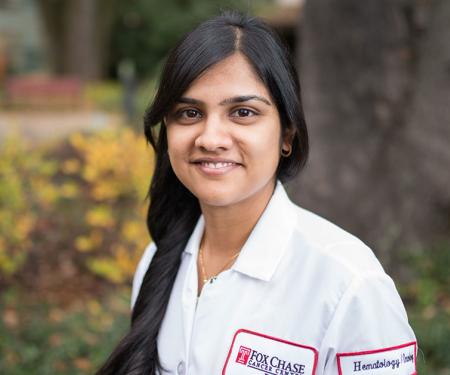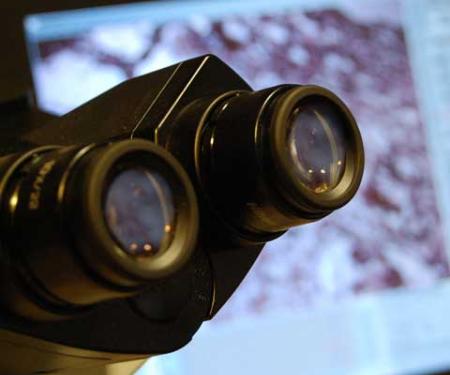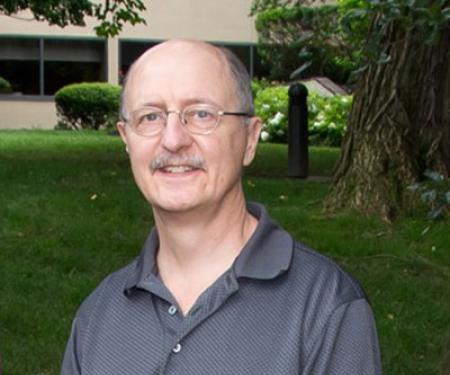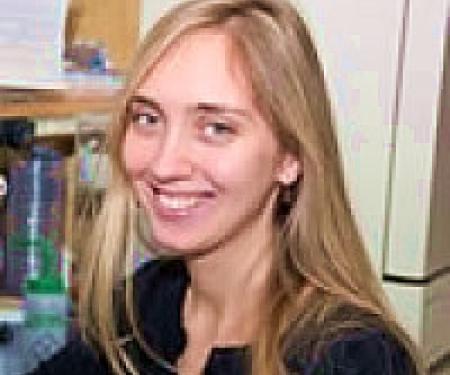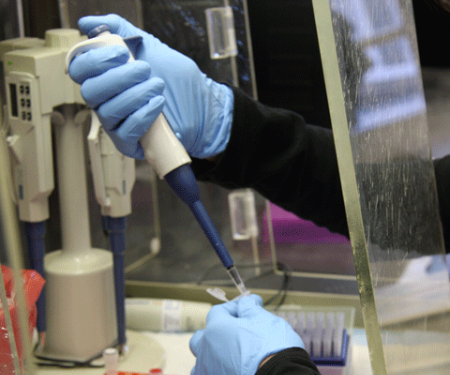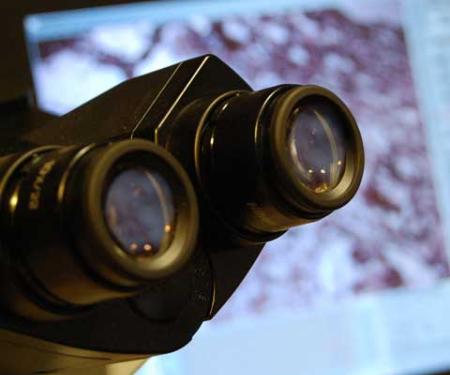This Fox Chase professor participates in the Undergraduate Summer Research Fellowship.
Learn more about Research Volunteering.
Related Articles
00 / 00

This Fox Chase professor participates in the Undergraduate Summer Research Fellowship.
Learn more about Research Volunteering.
Professor
Director, Cell Culture Facility
Co-Director, Immune Monitoring/Cell Sorting Facility
NK cells constitute about 10-15% of the normal lymphocytes in human peripheral blood. They are important sentinels of the innate immune system that can detect and kill tumor cells and virus-infected cells, and produce cytokines, including interferon-γ and tumor necrosis factor-α. NK cells are regulated by a dynamic balance between positive and negative intracellular signals that are transduced from cell surface activating and inhibitory receptors. This makes them an ideal cellular model system to study signal transduction crosstalk. Our goal is to understand the molecular mechanisms by which NK cells selectively recognize and attack tumor cells in the body, and design therapeutic strategies that can enhance their responses in patients.
Killer cell immunoglobulin-like receptors (KIRs) are key regulators of human NK cell function that transduce a negative intracellular signal to suppress NK cell killing responses toward normal cells. We are studying the molecular mechanisms controlling the function and surface expression of KIRs. Recent work in collaboration with Dr. Heinrich Roder at FCCC used NMR analysis to detect structural changes in the cytoplasmic domain of an inhibitory KIR upon its interaction with the SHP-2 protein tyrosine phosphatase (Cheng et al., Structure 2019). Improved understanding of the regulation and molecular function of KIR should lead to therapeutic treatments to lower the NK cell activation threshold to more efficiently attack tumor cells and virus-infected cells.
In addition, we are also studying the contributions of NK, T, and myeloid cells in immune responses toward cancer. Multiparametric flow cytometry is being employed to study the phenotype and function of immune cells in the peripheral blood of cancer patients. Over the past decade, we have been studying cohorts of patients with renal cell carcinoma (MacFarlane et al., Cancer Immunol. Res. 2014), chronic lymphocytic leukemia (MacFarlane et al., Oncoimmunol. 2017), inflammatory breast cancer (Fernandez et al., Breast Cancer Res. 2020), multiple myeloma (Pazina et al., 2021), and acute myeloid leukemia (Zhigarev et al., Cancers 2022). These immune phenotyping studies have identified biomarkers with prognostic value and potential targets for immunotherapy. The work also provided the foundation for a collaborative co-PI project with a psychologist at FCCC, Dr. Carolyn Fang, to establish relationships between psychosocial functioning and immune phenotype in indolent non-Hodgkins Lymphoma (NHL) patients. NHL patients were chosen for study, because they can become particularly stressed during their untreated indolent stage of disease. Exciting preliminary data indicate a strong association between increased stress or anxiety and changes in monocyte subpopulations, as well as reduced expression of some common NK cell activating receptors in patients with depressive symptoms.
Immunotherapies that enhance NK cell function to treat cancer are also under study, including therapeutic antibodies targeting PD-1, KIR, and SLAMF7. We are characterizing mechanisms by which these and other antibodies enhance NK cell antitumor responses through blocking inhibitory pathways, co-stimulating, or initiating antibody dependent cellular cytotoxicity (ADCC) responses. For example, our mechanistic studies have revealed that the therapeutic anti-SLAMF7 antibody, elotuzumab, triggers both ADCC and co-stimulatory signaling in NK cells toward multiple myeloma (Pazina et al., Oncoimmunol. 2017 and Cancer Immunol. Res. 2019). Furthermore, previous collaborative studies with Dr. Yuri Sykulev (Kimmel Cancer Center, Thomas Jefferson University, Philadelphia) studying the roles of integrins in ADCC responses (Steblyanko et al., 2015) spawned a co-PI project to perform basic mechanistic analysis of how nano- and micro-clustering of FcγRIIIa (CD16), integrins, and inhibitory receptors influences ADCC responses. Results from these studies are expected to substantially advance our understanding of basic mechanisms of NK cell receptor function and lead to improved designs of anti-tumor antibodies.
Upon gaining significant experience in immune phenotyping studies of cancer patients, Dr. Campbell became Co-Director of the FCCC Immune Monitoring/Cell Sorting Facility in 2016, where he designs, guides, and interprets flow cytometry-based correlative studies for ongoing immunotherapy clinical trials at Fox Chase and collaborating outside institutions. These studies have benefited from the rich clinical resources at FCCC and involve collaborations with a vast array of clinicians. One study with Dr. Namrata Vijayvergia (Dept. of Hematology/Oncology) found that patients with grade 3 neuroendocrine neoplasms treated with pembrolizumab had improved PFS if their peripheral blood pretreatment had higher peripheral T cell counts, lower TIM-3 expression on T cells, and lower activation state of NK cells and naïve T cells (MacFarlane et al., Cancer Immunol. Immunother. 2021). Another clinical trial in collaboration with Dr. Elizabeth Plimack (Dept. of Hematology/Oncology) tested the effect of guadecitabine + atezolizumab in bladder cancer patients and found longer survival in patients with higher baseline TCF1 expression and greater induction of HLA-DR and NKG2D on peripheral blood T and NK cells (Jang et al., Clin. Cancer Res. 2023). Also, in collaboration with Dr. Matthew Zibelman (Dept. of Hematology/Oncology), a clinical trial testing the impact of interferon-gamma + nivolumab in patients with advanced solid tumors found that shorter duration of treatment was associated with lower baseline counts of CD4+ T cells in peripheral blood and higher induction of PD-L1 expression on monocytes after initiation of treatment (Zibelman et al., Nature Commun. 2023).


Human natural killer (NK) cells and cancer
The Campbell lab has a longstanding interest in the mechanisms by which an assortment of germline-encoded receptors on the surface of human natural killer (NK) cells control their cytotoxic response toward tumor cells and to determine how that information might be exploited therapeutically to benefit cancer patients. In the course of over 25 years of independent research at Fox Chase Cancer Center, the group has gained extensive expertise in the culture and genetic manipulation of primary human NK cells and NK cell lines, as well as techniques in protein biochemistry, signaling, and molecular biology to study these intriguing innate immune cells. More recently, the team has focused extensively on clinical and translational research, in which they have studied the phenotype and function of NK, T, and myeloid cells in patients with various cancers and the mechanisms of action of several immunotherapeutic agents that exploit NK cell function in cancer patients.
Natural killer (NK) cells constitute about 10-15% of the normal lymphocytes in human peripheral blood. They are important sentinels of the innate immune system that can detect and kill tumor cells and virus-infected cells, and produce cytokines, including interferon-γ and tumor necrosis factor-α. NK cells are regulated by a dynamic balance between positive and negative intracellular signals that are transduced from cell surface activating and inhibitory receptors. This makes them an ideal cellular model system to study signal transduction crosstalk. Our goal is to understand the molecular mechanisms by which NK cells recognize and attack abnormal cells in the body, but are tolerant toward normal cells. This knowledge should lead to therapeutic strategies that can enhance NK cell responsiveness toward tumors and viruses in patients.
Killer cell immunoglobulin-like receptors (KIRs) are key regulators of human NK cell function. KIRs bind major histocompatibility complex class I (MHC-I) molecules on the surfaces of all healthy normal cells in the body. Upon detecting MHC-I, KIRs transduce a negative intracellular signal that suppresses NK cell killing responses. In this way, the inhibitory signal derived when KIR detect MHC-I is important for establishing tolerance toward normal cells. Many abnormal tumor cells and virally infected cells eliminate MHC-I expression, however, which abolishes the KIR negative signals and releases the NK cells to specifically attack only these abnormal cells and eliminate them from the body. We are studying the molecular mechanisms controlling the function and surface expression of KIRs. Recent work in collaboration with Dr. Heinrich Roder at FCCC used NMR analysis to detect structural changes in the cytoplasmic domain of an inhibitory KIR upon its interaction with the SHP-2 protein tyrosine phosphatase (Cheng et al., Structure 2019). Improved understanding of the regulation and molecular function of KIR should lead to therapeutic treatments to lower the NK cell activation threshold to more efficiently attack tumor cells and virus-infected cells.
In addition, we are also studying the contributions of NK cells in immune responses toward cancer. Multiparametric flow cytometry is being employed to study the phenotype and function of NK cells in the peripheral blood of cancer patients. Over the past decade, we have been studying cohorts of patients with renal cell carcinoma (MacFarlane et al., Cancer Immunol. Res. 2014), chronic lymphocytic leukemia (MacFarlane et al., Oncoimmunol. 2017), inflammatory breast cancer (Fernandez et al., Breast Cancer Res. 2020), multiple myeloma (Pazina et al., 2021), and acute myeloid leukemia (Zhigarev et al., in preparation). These immune phenotyping studies have identified biomarkers with prognostic value and potential targets for immunotherapy. The work also provided the foundation for a collaborative co-PI project with a psychologist at FCCC, Dr. Carolyn Fang, to establish relationships between psychosocial functioning and immune phenotype in indolent non-Hodgkins Lymphoma (NHL) patients. NHL patients were chosen for study, because they can become particularly stressed during their untreated indolent stage of disease. Exciting preliminary data indicate a strong association between increased stress and reduced expression of some common NK cell activating receptors.
Immunotherapies that enhance NK cell function to treat cancer are also under study, including therapeutic antibodies targeting PD-1, KIR, and SLAMF7. We are characterizing mechanisms by which these and other antibodies enhance NK cell antitumor responses through blocking inhibitory pathways, co-stimulating, or initiating antibody dependent cellular cytotoxicity (ADCC) responses. For example, our mechanistic studies have revealed that the therapeutic anti-SLAMF7 antibody, elotuzumab, triggers both ADCC and co-stimulatory signaling in NK cells toward multiple myeloma (Pazina et al., Oncoimmunol. 2017 and Cancer Immunol. Res. 2019). Furthermore, previous collaborative studies with Dr. Yuri Sykulev (Kimmel Cancer Center, Thomas Jefferson University, Philadelphia) studying the roles of integrins in ADCC responses (Steblyanko et al., 2015) spawned a co-PI project to perform basic mechanistic analysis of how nano- and micro-clustering of FcγRIIIa (CD16), integrins, and inhibitory receptors influences ADCC responses. Results from these studies are expected to substantially advance our understanding of basic mechanisms of NK cell receptor function and lead to improved designs of anti-tumor antibodies.
Upon gaining significant experience in immune phenotyping studies of cancer patients, Dr. Campbell became Co-Director of the new FCCC Immune Monitoring Facility (IMF) in 2016, where he designs, guides, and interprets flow cytometry-based correlative studies for ongoing immunotherapy clinical trials at Fox Chase and collaborating outside institutions. These studies have benefited from the rich clinical resources at FCCC and involve collaborations with a vast array of clinicians. The IMF is processing fresh blood samples from multiple clinical trials with the goals of identifying biomarkers that predict responses to immunotherapies in patients and discovering potential targets for additional immune therapy intervention. Accordingly, T-cell lymphoma patients treated with the PD-1 blocking antibody, pembrolizumab, had better progression free survival (PFS) if they started therapy with a higher relative percentage of CD4+ T lymphocytes in peripheral blood (Barta et al., Clin. Lymphoma Myeloma Leuk. 2019). Another study with Vijayvergia (Dept. of Hematology/Oncology) found that patients with grade 3 neuroendocrine neoplasms treated with pembrolizumab had improved PFS if their peripheral blood pretreatment had higher peripheral T cell counts, lower TIM-3 expression on T cells, and lower activation state of NK cells and naïve T cells (MacFarlane et al., Cancer Immunol. Immunother. 2021).
Former staff members
Sam Zahroun
Dmitry Zhigarev
Bryn Queeley
Sam Zahroun
Sei-ichi Yusa, PhD
George Hii, B.S.
Tracey L. Catina-Hughes, B.S.
Akiko Kikuchi-Maki, PhD
Nikolay Gresko, MD, PhD
Diana A. Alvarez Arias, PhD
Yingying Chen, MD, PhD, SM
S. M. Shahjahan Miah, PhD
Margaret M. Joyce, PhD
Nicholas Rodin, B.S.
Jennifer Oshinsky, B.S.
Michael Brusilovsky, PhD
Mowafaq Jillab, M.D.
Jun Hasegawa, PhD
Amanda K. Purdy, PhD
Poliana Patah, M.D., Ph.D.
Anna Thum, B.S.
Ashley Mentlik James, Ph.D.
Mohammed Haseebuddin, M.D.
Andres F. Correa, M.D.
Tatiana Pazina, Ph.D.
Kimberly Colby, B.S.
Judy Fang, B.S.
MacFarlane 4th, A.W., Jillab, M., Smith, M.R., Alpaugh, R.K., Cole, M., Litwin, S., Millenson, M.M., Al-Saleem, T., Cohen, A.D.,* and Campbell, K.S.* (2017) NK Cell Dysfunction in Chronic Lymphocytic Leukemia is Associated with Loss of the Mature Cells Expressing Inhibitory Killer Cell Ig-like Receptors, Oncoimmunology, 6:e1330235. PMCID: 5543845. *Corresponding authors. tandfonline.com
Pazina, T., James, A.M., MacFarlane 4th, A.W., Bezman, N.A., Henning, K.A., Bee, C., Graziano, R.F., Robbins, M.D., Cohen, A.D. *, and Campbell, K.S. * (2017) The anti-SLAMF7 antibody elotuzumab mediates NK cell activation through both CD16-dependent and –independent mechanisms, Oncoimmunology, 6:e1339853. PMCID: 5599094 tandfonline.com
Davis, Z.B., Cogswell, A., Hamish, S., Mertsching, A., Boucau, J., Wambua, D., Le Gall, S., Planelles, V., Campbell, K.S., and Barker, E. (2016) A conserved HIV-1-derived peptide presented by HLA-E renders infected T-cells highly susceptible to attack by NKG2A/CD94-bearing natural killer cells. PLoS Pathog, 12:e1005421. PMCID: 4735451
Shemesh, A., Brusilovsky, M., Hadad, U., Teltsh, O., Edri, A., Rubin, E., Campbell, K.S., Rosental, B., and Porgador, A. (2016) Survival in acute myeloid leukemia is associated with NKp44 splice variants. Oncotarget, 7:32933-32945. PMCID: 5078064.
Steblyanko, M., Anikeeva, N., Campbell, K.S., Keen, J.H., and Sykulev, Y. (2015) Integrins Influence the Size and Dynamics of Signaling Microclusters in a Pyk2-dependent Manner. J. Biol. Chem., 290:11833-11842. PMCID: 4424324.
MacFarlane 4th, A.W., Jillab, M., Plimack, E.R., Hudes, G.R., Uzzo, R.G., Litwin, S., Dulaimi, E., Al-Saleem, T., and Campbell, K.S. (2014) PD-1 expression on peripheral blood cells increases with stage in renal cell carcinoma patients and is rapidly reduced after surgical tumor resection. Cancer Immunol. Res., 2:320-331. PMCID: 4007343.
Purdy, A.K., Alvarez-Arias, D.A., Oshinsky, J., James, A.M., Serebriiskii, I., and Campbell, K.S. (2014) The AP-2 clathrin adaptor mediates endocytosis of an inhibitory killer cell Ig-like receptor (KIR) in human NK cells. J. Immunol., 193:4675-4683. PMCID: 4269369.
Brusilovsky, M., Cordoba, M., Rosental, B., Hershkovitz, O., Andrake, M.D., Pecherskaya, A., Einarson, M.B., Zhou, Y., Braiman, A., Campbell, K.S., and Porgador, A. (2013) Genome-wide siRNA screen reveals a new cellular partner of NK cell receptor KIR2DL4: heparan sulfate directly modulates KIR2DL4-mediated responses. J. Immunol., 191:5256-5267. PMCID: 3836631.
This Fox Chase professor participates in the Undergraduate Summer Research Fellowship.
Learn more about Research Volunteering.
